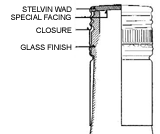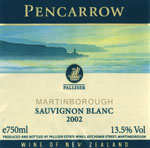![]()
Recent Articles

Get
all the evaluations for
the December
Release
Subscribe
to Vintage Assessments today
by Clicking
Here
This
not-for-profit website is dedicated to the discerning reader!
Screwcaps
Making Corks a Thing of the Past?
National Post Weekly Wine & Spirits Columnist
Saturday, November 8, 2003
winefind.ca
If you want to buy a wine, just click on the wine name
below and you will instantaneously connected with the LCBO database. The wine
name will appear in blue and all you have to do is click on the name again and then the next screen will provide
details along with the store search. Just click on the
search. The number of bottles in each store is updated nightly.
You should call the store first to see if stock still remains (each store
phone number is provided).
At one time, almost all Ontario wines came with screwcaps. The advent of
bottles with corks along with varietal labels was a cause celeb. Once
established, no self-respecting Ontario wine would be caught with a twist
and shout cap. Indeed, only hapless economy class airline passengers were
served nameless screwcap stuff.
Well, what goes around comes around. This week Henry of
Pelham announced the upcoming release of Canada’s first VQA
screwcap white. Fed up with the cork taint problem, which afflicts up to
15 bottles out of a hundred, producers began looking for other less
problematic closures. Composite and plastic corks were tried, but they too
have had their problems.
 Decades
ago, renowned scientist Dr.
Helmut Becker at Germany’s Geisenheim Research Institute
extolled the virtues of crown caps (the type used on beer) as an
alternative. The only company, to my knowledge, which adopted Becker’s
recommendation was Vancouver Island’s idiosyncratic, highly sought-after
Venturi-Schulze Vineyards
(to check out their wines click
here).
It was the advent of precision machining technology that permitted
screwcaps to suddenly become a real qualitative alternative. That and
consumer acceptance.
Decades
ago, renowned scientist Dr.
Helmut Becker at Germany’s Geisenheim Research Institute
extolled the virtues of crown caps (the type used on beer) as an
alternative. The only company, to my knowledge, which adopted Becker’s
recommendation was Vancouver Island’s idiosyncratic, highly sought-after
Venturi-Schulze Vineyards
(to check out their wines click
here).
It was the advent of precision machining technology that permitted
screwcaps to suddenly become a real qualitative alternative. That and
consumer acceptance.
Basically, the problem with cork is a compound
called 2,4,6-trichloroanisole or TCA. It is created by a
combination of natural mould in the cork bark and chlorine in the solution
used to clean the bark. The combination can
produce distinct musty smells reminiscent to an old carpet or wet
cardboard. This odour, however, can prove to be quite elusive. I remember
accepting a wine served very cold, only to taste it ten minutes later and
discover that it had developed disagreeable mouldy orange rind notes. It
was “corked” and replaced with a new bottle by the LCBO.
With average taint levels of 5 to 8%, the Australian
winemakers were the first to take the plunge in 2000 when some
13 leading Riesling producers in the Clare Valley decided to use Stelvin
closures. Today, virtually all producers in the region are using scewcaps.
In February 2001, winemakers from the Marlborough region of New Zealand
held a workshop to consider the ‘long-skirted screwcap’ closure
to replace cork. Under the aptly named New Zealand Screwcap Wine Seal
Initiative, we now find that more than 15% of all New Zealand wines come
with a screwcap.
Acceptance is growing, especially in the U.K. where chains such as
Sainsbury and Marks & Spencer who often label their own wine and
insist that their suppliers switch to plastic cork or screwcap closures. Tesco,
another leading U.K. supermarket group, already sells more than 60
screwcap wines. As for quality, it would appear that wines with
screwcaps are winning awards. In fact, so far this year Vintages has
featured six screwcap wines and all were above average in quality (some
are still available).
 From
Australia’s McLaren Vale Dowie
Doole 2002 Chenin Blanc (709246
- $14.50) is a definite winner with its peach nose and dry, honeyed
but crisp, ripe peachy flavours. From New Zealand, you will be
From
Australia’s McLaren Vale Dowie
Doole 2002 Chenin Blanc (709246
- $14.50) is a definite winner with its peach nose and dry, honeyed
but crisp, ripe peachy flavours. From New Zealand, you will be  hard
pressed to beat Palliser
Estate 2002 Pencarrow Sauvignon Blanc
(738997)
at
$17.95 and still available in a few stores. This Martinborough, North
Island region white has a brilliant nose focusing on fresh Anjou pear,
sweet grass and a touch of guava. It is very dry and crisp with grassy
flavours and hint of guava on the finish.
hard
pressed to beat Palliser
Estate 2002 Pencarrow Sauvignon Blanc
(738997)
at
$17.95 and still available in a few stores. This Martinborough, North
Island region white has a brilliant nose focusing on fresh Anjou pear,
sweet grass and a touch of guava. It is very dry and crisp with grassy
flavours and hint of guava on the finish.
The French Vin de Pays d’Oc debut Domaine
de La Baume 2002 Viognier (723916 - $14.85) was just
released in Vintages last month. Look for a honeyed,
ripe lemon-tangerine citrus nose and rounded and yet still lively, pear
and ripe red apple flavours followed up by a faintly cedary finish.
Winemaker Ashley Huntington will be appearing at the upcoming Vintages Young Winemakers
event on November
19, 2003 (to see details click
here).
Discovering that the Swiss have a screwcaps for decades and
that wine giant Gallo has just released a portion of its
Turning Leaf range in Stelvin in the UK market, must have finally prompted
owner Paul
Speck
of Henry of Pelham to take the plunge. Last year he stated “we need a heavyweight like Mondavi or Penfolds to start. Our
reputation in Canada just too delicate to do it.” Fortunately
opinions change and just his week Speck admitted that the time had come to
go ahead with this project.
 Come
next month, the new screwcap edition of Henry
of Pelham 2002 Barrel Fermented Chardonnay
(268342 - $18.95 Vintages
Essentials) will hit the shelves. “Instead
of using one of our less expensive brands,” says Paul Speck, “we used a premium wine. We are demonstrating both ease of use and
absence of any risk of cork taint.”
Come
next month, the new screwcap edition of Henry
of Pelham 2002 Barrel Fermented Chardonnay
(268342 - $18.95 Vintages
Essentials) will hit the shelves. “Instead
of using one of our less expensive brands,” says Paul Speck, “we used a premium wine. We are demonstrating both ease of use and
absence of any risk of cork taint.”
 I
blind tasted both bottles: one with a cork (which is currently on the
Vintages shelves), the other with a screwcap. The latter was initially a
tad lighter, crisper and brighter with dry Anjou pear flavours and just a
hint of oak. Served chilled, I doubt whether many would be able to
articulate a clear preference. They are very similar and so they should
be. The exciting thing is to see how they evolve because the screwcap
bottle should maintain its freshness and fruit vibrancy for a longer
period.
I
blind tasted both bottles: one with a cork (which is currently on the
Vintages shelves), the other with a screwcap. The latter was initially a
tad lighter, crisper and brighter with dry Anjou pear flavours and just a
hint of oak. Served chilled, I doubt whether many would be able to
articulate a clear preference. They are very similar and so they should
be. The exciting thing is to see how they evolve because the screwcap
bottle should maintain its freshness and fruit vibrancy for a longer
period.
Front and Back cover (4.2 MB) Click Here
Pages 1-4 (296 kB) Click Here
Pages 5-176 (34.5 MB) Click Here
Index - Pages 177-204 (3.8 MB) Click Here
Check
out our winefind.ca tasting notes database
Our tasting note database goes back to January 1, 2001 and covers every Vintages release product for the past 31 months. There are approximately 5,000 notes in the database data. Just enter the name of the product, supplier name or CSPC number. Or you can search by type of wine, country of origin, even wine agent! Nothing could be easier. When you get your search results (starting with the most recent release), click on the item name and you will instantaneously connected to the FBTI Vintage Assessments database. You will see our tasting note along with the name of the agent. You can get information on the agent by clicking on the agent’s name. Also, you can check LCBO store inventory by clicking on Check LCBO Availability. It will automatically take you to the item you want to search.
To use our winefind.ca Tasting Notes Database: click here
Subscribe to Vintage Assessments Today • Click Here
|
Vintages December 2003 Release
|
Copyright Food & Beverage Testing Institute of Canada
2004
Prior written permission is required for any form of reproduction
(electronic or other wise) and or quotation.
Contact Michael Vaughan at
mbv@total.net